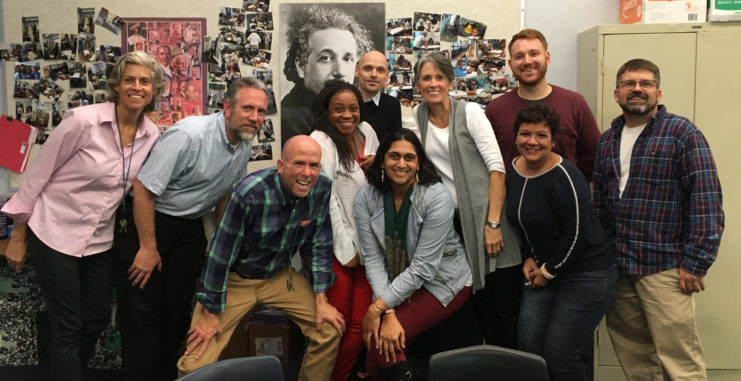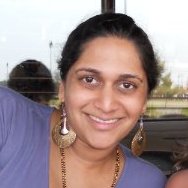
Supporting English Language Development Integration through Teacher Inquiry
As public school educators, we are all very familiar with our districts adopting new initiatives every year. Perhaps one year Integrated English Language Development (ELD) is all the rage, and then Positive Behavioral Interventions and Supports takes center stage, followed by Restorative Practices the year after that. Often, the initiatives are excellent, but many of them fizzle in practice because we are not able to support their ongoing integration into our classrooms in a sustainable way. Research says that only about 5% of what we do in a stand alone Professional Development training gets implemented. As an instructional coach in Alameda Unified, I wanted to find a way to create ongoing learning experiences for teachers to better understand and implement the many initiatives that we are holding.
I was lucky enough last year to participate in the Mills Teacher Scholars inquiry group at Encinal High School. This experience gave me an opportunity to grapple with my dilemma and begin coming up with some action ideas. Inspired by the well-supported learning space in my inquiry sessions, I began to wonder could inquiry be the vehicle that supports continuous professional learning on our various initiatives? With this hope in mind, I decided to start two teacher inquiry groups this year that included teachers from Alameda High School, which is our big comprehensive high school, and Island High School, which is our continuation school. One of the challenges in Alameda Unified is that we don’t have any set teacher collaboration time, so I worked to get approval from my supervisor to time-card teachers who wanted to opt-in to these inquiry sessions.
As I led these inquiry groups for teachers, I was simultaneously engaging in inquiry myself, collecting data about how these sessions were impacting their teaching, and adjusting my agendas to best serve their learning. My data source was teachers’ think sheets – this is where they recorded their inquiry focus, student learning goals, observations, and action plans. Each month, when I returned as a participant to my own inquiry meetings at Encinal, I analyzed and reflected with colleagues on these thinksheets.
One question that emerged for me early on in this process was how can I find the right balance between setting an overarching focus for the group and giving teachers the agency to choose their own line of inquiry? I realized that I was hoping the group would center our efforts this year on Integrated ELD, but I chose not to force that theme. As I sat down to analyze their first round of think sheets, I was happy to find that most teachers did choose to focus on a topic within Integrated ELD, but in many cases the theme was very general. After talking with colleagues in my inquiry session about these observations I decided my next step would be to spend some of the next teacher inquiry meeting revisiting what Integrated ELD means, studying the ELD standards, and regrounding in best practices. We asked ourselves “What are we trying to do with Integrated ELD?” After this session, I noticed the specificity within each teacher’s inquiry increased. For example, instead of, “I want to have more academic discourse,” teachers began asking, “What is the academic language required in this lesson? What are my students actually saying? Am I providing them this language – is that what they are using?”
Another big learning I had this year was around data. Good, informative data is difficult to collect and teachers are busy people. I noticed in inquiry sessions that the student work samples teachers were bringing in as data didn’t always shed light upon the questions that they were trying to answer. As a coach, I had the time to support data collection, so I began scheduling visits to classrooms to help collect relevant data. Often it was as simple as setting my phone on a table and recording student academic talk. Teachers were struck by how much more they could learn from even a short recording of students discussing the work than by their written work. This type of recorded data deepened our practice because the data was directly linked to the teachers’ inquiry questions.
As I integrate what I have learned from this year and think about where we are heading, I am left wondering how could we bring an inquiry practice to our entire district? How can we support both teachers and leaders to step into a learning stance together? The teachers I’ve worked with this year have found tremendous value in this professional learning space. The protocols, the structures, and the deep focus on data make collaborative inquiry feel like a meaningful and professionalizing experience. As a participant in inquiry, I have felt firsthand how empowering it can be to carve out the reflective time to really study my own practice and partner with my colleagues to improve. I look forward to sharing this experience more widely in Alameda Unified in the years to come.
This article was written in September 2020, Mills Teacher Scholars changed their name to Lead by Learning in November of 2020.
 Sheila SatheWarner is the current Principal of Lincoln MS in Alameda Unified School District and last school year was a Teacher on Special Assignment in Alameda Unified School District. Her role in Alameda as a Teacher on Special Assignment entailed coaching teachers, leading professional development, and supporting English Learners through integrated and designated ELD. She was a participant in Mills Teacher Scholars inquiry through a group at Encinal High School and she also led inquiry for teachers at Alameda and Island High Schools.
Sheila SatheWarner is the current Principal of Lincoln MS in Alameda Unified School District and last school year was a Teacher on Special Assignment in Alameda Unified School District. Her role in Alameda as a Teacher on Special Assignment entailed coaching teachers, leading professional development, and supporting English Learners through integrated and designated ELD. She was a participant in Mills Teacher Scholars inquiry through a group at Encinal High School and she also led inquiry for teachers at Alameda and Island High Schools.
